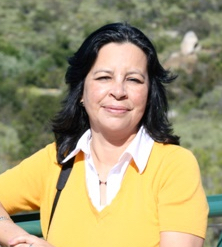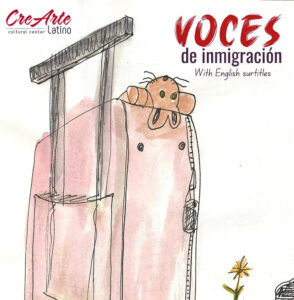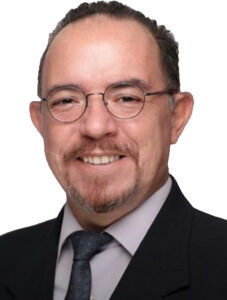A Sarasota theater presents interviews with real-life people. Now they want to take the show to the community.
By Johannes Werner
Original Air Date: November 20, 2024
Host: A new Florida law makes it a felony to transport undocumented Immigrants across state lines. The incoming president has announced mass deportations, including an estimated million people in Florida. Immigrants have been the object of political fear mongering, and the punching bag of recent election cycles. What gets lost in all this is that immigrants are humans too, with families and aspirations, and legitimate reasons why they are here. So, two local immigrants thought it was time to team up, interview other immigrants in the region, and put their life stories out there, on a stage in Sarasota.
Actress: Soy Rosario. Tengo cincuenta y dos años. Soy de Guatemala.

Elvira Sánchez-Blake
Johannes Werner: That’s one of the actors at Crearte, impersonating an undocumented immigrant from Guatemala. She is telling the story of Rosario, a fictitious name.
The small theater put three sold-out performances on stage last weekend. Now, they are trying to break out from the confines of the theater in a strip mall in North Sarasota. Their next goal is to find schools, churches, and other organizations in Sarasota and Manatee that are willing to stage this production, titled Voces de Inmigración.
Elvira Sánchez-Blake: We are open to any proposals. We would love to present it at universities, schools, other theaters, community, programs, videos, TV, whatever. We don’t have anything right now. But yes, we would love to do that.
JW: The play emerged from the experience of “Voices of Motherhood”, a stage production by Crearte this spring.
ESB: And it was very successful with the same format. It was testimonials about the experience of motherhood. And it was very moving and many people were very taken by that format and the idea. So, in the summer, we talked with Carolina, Juan Pablo, and the production team of Crearte, and we said, “Why don’t we do this with immigration?”
 JW: The main goal, says Elvira Sánchez-Blake, is to raise awareness.
JW: The main goal, says Elvira Sánchez-Blake, is to raise awareness.
ESB: I think the main thing was the people become aware of what’s happening because many people don’t know. They don’t know what’s going on with the immigrants. They only have one idea: Immigrants are here to take jobs and take resources, and they are going to steal. And to all this discourse and the narrative that they portray about immigrants. I think it’s terrible that the propaganda demonizes and portrays immigrants as dehumanizing. And many people for the first time saw this as a real human being that come here to do, to have a better life, to have opportunities to work, to do many things that the Americans don’t want to do. And so I think creating awareness was the main issue.
JW: Voces de Inmigración is a one-hour performance — no break — based on interviews with 15 area immigrants who were asked the same questions. Excerpts of the transcripts of these interviews are then read by actors — both amateurs and professionals — using fictitious first names for the interviewees. The readings are done in the original Spanish, while subtitles with an English translation are flashing across the back of the stage.
ESB: We selected the actors, the people who were reading the interviews, and we trained them to be able to produce the interpretation of each one of the testimonials. So they did a tremendous job because even if they were reading, they were acting, they were interpreting, they were trying to project the accent. For example, it’s a different accent from Venezuela and from Guatemala and from Mexico. And I think they projected that at the end.
JW: How did they find their interviewees?
ESB: I mean, it’s not difficult to find them. They are our friends. They are people who work here in gardening, in restaurants, in cleaning. And so we knew many of them. Many of them were part of Crearte Latino team. And they accepted the challenge. The interviews are completely anonymous. So they would change the names. And we didn’t provide enough information so that they can be identified. Some of them wanted to keep their name and they didn’t care about being identified because they don’t have any problem.

Juan Pablo Salas
So yes, but I think the main challenge was, for example, finding men. Men don’t like to tell their stories. We spent three months collecting the interviews, we had like 15 interviews with men with a big array of experiences. We didn’t want to have only one experience or only undocumented immigrants, for example. No, we wanted to have all kinds of experiences because we are all immigrants and we come from different origins, from different experiences, but countries and I think we achieve having a showcase of people from different countries, ages, social status, education. And that’s why we showed not everybody comes here are undocumented or coming from a violent or terrible situation. We come sometimes with money, with a visa, with all the privileges and still we find many challenges in the process, so we wanted to present different experiences.
JW: If a local group would like to stage a performance of Voces de Inmigración, the producers are eager to listen, and they are flexible.
ESB: If someone asks us to have a different format, we will, of course. We are open to accommodate and to adapt it to a different format. I know that testimonial theater is a difficult format for many people who are used to the traditional theater. But the idea was to focus on the messages and the stories, on the testimonials, and that’s why we didn’t act it, and we didn’t have a stage or anything like that, and I think it worked. Many people were very moved by the stories. And with that, if someone wants to say, “Well, why don’t we act it? Why don’t we do that different format?” We will be ready to do it.
JW: Sánchez-Blake and co-producer Juan Pablo Salas are well positioned as messengers for immigrants. Sánchez-Blake has years of teaching and research experience; she recently retired from Michigan State University. And Salas, who hails from Colombia, has years of experience as a journalist, and he has been the voice of La Zeta and La Número Uno, two of the biggest-reach Spanish-language stations in the region.
To get in touch with the producers of Voces de Inmigración, send an email to Crearte at info@creartelatino.org or call 941-732-7191.
Reporting for WSLR News in Sarasota, this has been Johannes Werner.
WSLR News aims to keep the local community informed with our 1/2 hour local news show, quarterly newspaper and social media feeds. The local news broadcast airs on Wednesdays and Fridays at 6pm.